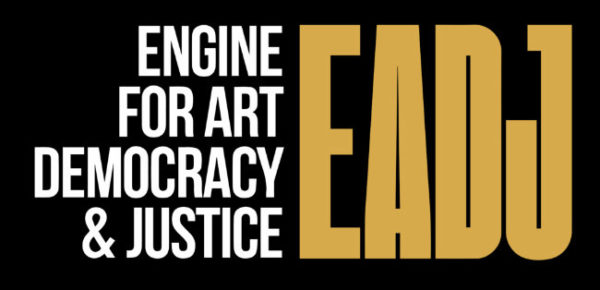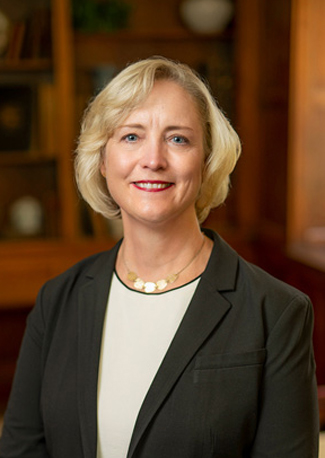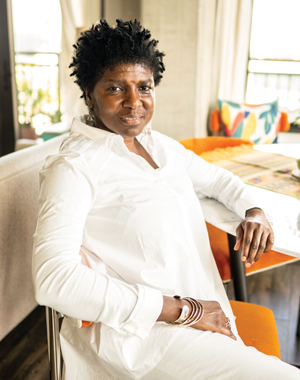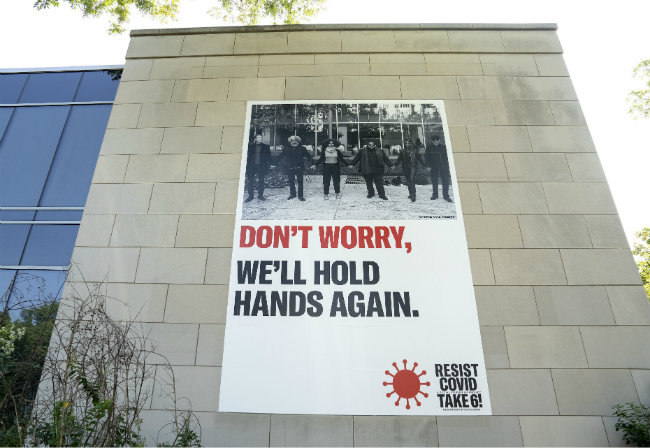Hosted in collaboration with Fisk University, Frist Art Museum and Millions of Conversations
 Vanderbilt University is partnering with Fisk University, the Frist Art Museum and Millions of Conversations to host “Engine for Art, Democracy and Justice,” a trans-institutional series of virtual conversations and artistic collaborations focused on healing at a time of significant social unrest.
Vanderbilt University is partnering with Fisk University, the Frist Art Museum and Millions of Conversations to host “Engine for Art, Democracy and Justice,” a trans-institutional series of virtual conversations and artistic collaborations focused on healing at a time of significant social unrest.

“Engine for Art, Democracy and Justice advances Vanderbilt’s mission and builds on our One Vanderbilt approach by bridging the arts and humanities to politics, policy and the social sciences,” said Vanderbilt University Provost and Vice Chancellor for Academic Affairs Susan R. Wente, who holds the Cornelius Vanderbilt Chair. “As Vanderbilt continues specific actions to advance racial justice and promote equity and inclusion, the initiative will be an excellent forum for bringing together diverse voices about the pressing issues of our times.”
Engine for Art, Democracy and Justice was conceived by Maria Magdalena Campos-Pons, Cornelius Vanderbilt Chair and professor of art at Vanderbilt, and its first webinar theme will be “Redefining Monuments” Sept. 23 and 30.

“Throughout history, art has always served as an agent for social change,” said Campos-Pons, a renowned artist whose work often draws upon themes from her native Cuba. “With the Engine for Art, Democracy and Justice, we hope to promote positive values of inclusivity that honor the suffering and struggle of our forebears while sparking dialogue and understanding.”
The initiative will bring Carrie Mae Weems’ RESIST COVID TAKE 6! public art campaign to Nashville in September, with banners being unveiled at Vanderbilt’s Fine Arts Gallery, Fisk University’s Carl Van Vechten Gallery and the Frist Art Museum. Weems’ series draws attention to the racial inequities exposed by the COVID-19 pandemic.
“Art brings us together, comforts, empowers, heals, inspires, instructs and demystifies misconceptions about diverse aesthetics, cultures, religions and social norms,” said Susan H. Edwards, executive director and CEO of the Frist Art Museum. “Artists can also inspire us to action, for what we do in response to discovering a new way of seeing the world is how we move society toward understanding, tolerance, equity, reciprocity and justice.”
Marina Fokidis is serving as program curator for the fall program “Living in Common in the Precarious South(s).” Each virtual gathering is free and open to the public, and all sessions begin at 10 a.m. central time. Advance registration is required.
“Redefining Monuments,” Sept. 23 and 30
Register here for Sept. 23. Speakers for the first webinar on Sept. 23 will be artist Hank Willis Thomas; artist Carrie Mae Weems; and Monika Szewczyk, director, De Appel Center in Amsterdam, the Netherlands. Kevin D. Murphy, Andrew W. Mellon Chair in the Humanities and professor of history of art at Vanderbilt University, will moderate the discussion. Ben Davis, critic for Artnet News, will be the respondent.

Vanderbilt will assist with the installation of Weems’ RESIST COVID TAKE 6! banners and distribution of her campaign materials. These include posters, tote bags, buttons and other visual aids to raise awareness of the disproportionate impact of COVID-19 on the Black and Latinx communities.
Register here for Sept. 30. Speakers for the second webinar on Sept. 30 will be artist Ibrahim Mahama; Caroline Randall Williams, writer-in-residence at Vanderbilt University; and curator and writer Bonaventure Soh Bejeng Ndikung. Jamaal Sheats, director and curator of the Fisk University Art Galleries and assistant professor of art at Fisk University, will moderate the discussion. Jane Landers, Gertrude Conaway Vanderbilt Professor of History at Vanderbilt University, will be the respondent.
An artist intervention by Vanderbilt writer-in-residence Caroline Randall Williams and musician and record producer T Bone Burnett will be commissioned by EADJ.
“These are trying times on so many fronts, and programs like these inspire all of us to work towards a better tomorrow,” said Fisk University Senior Vice President Jens Frederiksen. “Throughout its rich history, Fisk has always been a thought leader in the intersection of artistic expression, social justice and political action. We look forward to our students and faculty experiencing a host of different perspectives and insights around these pressing topics.”
“Paths of Emerging Solidarities,” Oct. 7 and 14
Register here for Oct. 7. Speakers for the Oct. 7 webinar will be Theaster Gates, artist and professor of art at the University of Chicago; artist Otobong Nkanga; and artist Rina Banerjee. Mark Scala, chief curator at the Frist Art Museum in Nashville, will moderate the discussion. The respondent will be Franklin Sirmans, director of the Pérez Art Museum in Miami, Florida.
Register here for Oct. 14. Speakers for the Oct. 14 webinar will be artist and curator Gabi Ngcobo; Nikos Papastergiadis, professor in the School of Culture and Communication and director of the Research Unit in Public Cultures at the University of Melbourne; and Salah M. Hassan, Goldwin Smith Professor and director of the Institute for Comparative Modernities at Cornell University. Marina Fokidis, writer, curator and editor-in-chief of the journal South as a State of Mind, will moderate the discussion. The respondent will be Allison Glenn, associate curator, contemporary art, Crystal Bridges Museum of American Art in Bentonville, Arkansas.
“Performativity and the Social Body,” Oct. 21 and Nov. 4
Register here for Oct. 21. Speakers for the Oct. 21 webinar will be Doris Sommer, director of the Cultural Agents Initiative and Ira and Jewell Williams Professor of Romance Languages and Literatures and of African and African American Studies at Harvard University; Shamell Bell, dancer, choreographer and lecturer on theater, dance and media at Harvard University; artist and poet Cecilia Vicuña; and Nikki A. Greene, assistant professor of art at Wellesley College. The moderator will be Candice Amich, assistant professor of English at Vanderbilt University. The respondent will be Grace Aneiza Ali, assistant professor, Department of Art and Public Policy at New York University’s Tisch School of the Arts.
A performance by dancer and choreographer Shamell Bell will be commissioned by EADJ.
Register here for Nov. 4. Speakers for the Nov. 4 webinar will be writer, philosopher and curator Paul Preciado; choreographer and performer Okwui Okpokwasili; and artist Regina José Galindo. Octavio Zaya, writer, curator, editor and executive director of the Cuban Art Foundation in Boston, will moderate the discussion. The respondent will be Pablo Lafuente, director of the Modern Art Museum in Rio de Janeiro.
“Love Transmutation,” Nov. 11 and 18
Register here for Nov. 11. Speakers for the Nov. 11 webinar will be record producer, musician and songwriter T Bone Burnett; Paul Kwami, director of the Fisk University Jubilee Singers; and Dina Bennett, curatorial director of the National Museum of African American Music. Lorenzo F. Candelaria, Martha Rivers Ingram Dean’s Chair and professor of musicology at Vanderbilt University’s Blair School of Music, will moderate the discussion. The respondent will be Joseph Horowitz, noted author on American music, concert producer and teacher.
Pauchi Sasaki, Peruvian composer of classical experimental music, will premiere a composition commissioned by EADJ.
Register here for Nov. 18. Speakers for the Nov. 18 webinar will be Maria Magdalena Campos-Pons, Cornelius Vanderbilt Chair and professor of art at Vanderbilt University; T.S. Harvey, associate professor of anthropology at Vanderbilt University; and Samar Ali, BS’03 and JD’06, CEO and founding president of Millions of Conversations and adjunct professor at Vanderbilt Law School. Susan H. Edwards, director and CEO of the Frist Art Museum, will moderate the discussion. The respondent will be Edward Fischer, Cornelius Vanderbilt Chair and professor of anthropology at Vanderbilt University.
Jamaal Sheats and Maria Magdalena Campos-Pons will create an artists intervention at Nashville’s Martin Luther King Jr. Magnet School in collaboration with the Harvard University Pretext Project.
“It is our honor to join hands in partnership with Vanderbilt and Fisk universities and the Frist Art Museum around this monumental endeavor,” said Samar Ali, BS’03 and JD’06, CEO and founding president of Millions of Conversations and adjunct professor at Vanderbilt Law School. “We believe strongly in the power of the Engine for Art, Democracy and Justice to help us realize truth and reconciliation in America today. Helping us to deal with our past and present while simultaneously inspiring us to see one another’s humanity, EADJ is driving us towards a future rooted in commonly shared 21st-century values.”
Other EADJ partners are the Cultural Contexts of Health and Wellbeing Initiative, Vanderbilt University; and the Vanderbilt College of Arts and Science, including its Art and History of Art and Architecture departments.
EADJ speakers and program details are subject to change and will be updated on the EADJ and Vanderbilt websites. For more information, email Raquelle K. Bostow, EADJ project manager at Vanderbilt University, or Phillip Townsend, EADJ fellow and doctoral candidate, University of Texas at Austin.